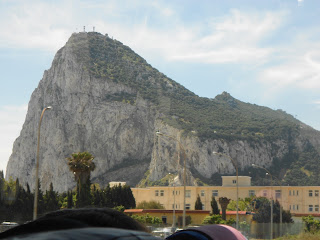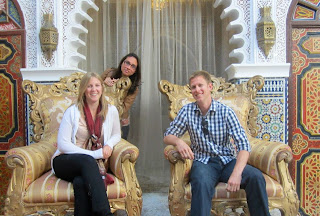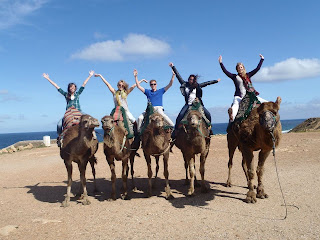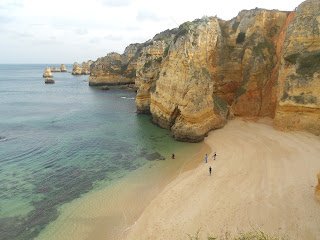 |
| At the Rock of Gibraltar, with the coast of Africa in the background |
Anyways,
Our trip to Morocco was probably the most
culture shock that I have experienced this whole trip. We started our trip in
Gibraltar, which is the southern most point of Europe and is only a 23 kilometer
and 30 minute boat ride away from Africa. Because Gibraltar is a province of
the UK, they speak English there, so it was weird in the first place going from
somewhere that still felt like we were in Spain, but where English is the
primary language. We went on a tour there, going up the infamous Rock of
Gibraltar and hanging out with the monkeys (which are mean and steal your
food!) and having a beautiful view of Africa in the distance in one direction
and Spain in the other. We also had the chance to drive across the only runway
in the world where traffic actually has to stop in order to allow planes to
land and take off.
 |
| Mean monkey |
 |
| We went to the top of that! (by car) |
Then we left Gibraltar (but not before
having to ask at least 6 different people about how to get our passports
stamped, which we finally successfully did) and boarded the ferry for Ceuta,
which is a Spanish city in the north of Africa. We boarded a new bus and drove
straight to the Moroccan border, where we waited for about 50 minutes to have
our passports checked and to be cleared through. Once we finally made it past
the border and were officially in Morocco, we still had about a half hour drive
to our hotel in M’Diq. Although Spain and Morocco are only separated by a few
barriers and lots of policemen, the differences between the two were noticeable
right away. We were definitely aware that we had entered a whole new culture.
There were men and women in their gilabis,
and the Moroccan flag, red with a green star (representing the 5 points of
Islam) waved in the breeze. As we drove, we began to see some of the poverty
that we had heard was so prevalent. Entire neighborhoods of houses and
buildings that looked like they were abandoned and should be condemned had
clothes hanging on the line on the roof. But areas that are a part of public
infrastructure were well maintained and beautiful, like the walkways along the
coast and the pedestrian bridges over the major roadways. However, those
weren’t the only contradictions we experienced during our trip. During our tour
of the first town, Chefchaouen, our adorable little (literally, he was probably
only 5 feet tall) tour guide, who we affectionately called Habibi (meaning “my
love” or “my darling” in Arabic) surprised us all by pulling out his Iphone to
show us a picture on his facebook. And all over the town, its winding narrow
roads made us feel like we were stepping back in time, that is, until we saw
the satellite dishes scattering the rooftops, which ruined the ambiance a
little bit. But Chefchaouen was still a beautiful little town, wedged in the Rif Mountains with lots of hills and beautiful views. There were also plenty
of adorable cats and kittens running around. The explanation for this according
to Habibi is “because there’s no Chinese here”, which got some laughs out of the
group. I suppose political correctness isn’t a priority in rural towns of
Morocco.
 |
| Getting henna in M'Diq |
 |
| The blue walls are supposed to keep the mosquitoes away |
 |
| "Of course I have an Iphone; Who doesn't??" |
Then we went to another little town called
Tangiers, which is a bigger town and closer to the border. We had a chance to
do some shopping for leather goods, fabrics, and other souvenirs to take home
with us. In Morocco, everything is bargained. If a vender tells you that a bag
costs 40 euros, a good bargainer can get it for somewhere around 25. I am not a
good bargainer. I avoided the buying of things for that reason exactly. I
bought one thing that was supposed to be 6 euros and I got it for 5. That is
not how bargaining is supposed to be done. Shopping there is pretty much the
most intimidating thing ever for someone as indecisive as me. If you even look
at something for more than 5 seconds, there will be a person breathing down
your neck, telling you how fine of a product that is and asking if you how much
you want to pay for it. I just like to look at stuff! It was stressful. Then we
went to a natural pharmacy where we were given samples of de-stressing lotions
and neck massages. Our tour guides must have known that we were all going to
need that after a nerve-racking 30 minutes of heckling with shop keepers with a
mixture of broken Spanish and broken English. We all bought a few of the
products they were selling and spent way more money than we should have, and
made our way to our bus first to stop for lunch in a beautiful restaurant and then to drive to our hotel for the night.
 |
On our way to the hotel, we encountered some kids,
probably around 16 or 17 years old, who started banging on the side of the bus
while we were stopped in traffic. At first we thought that they were just being
kids and trying to be funny and mess with the tourists. Then when a few kids
ran out in front of the bus to stop it, and we saw some of the other ones actually
roll under the bus. We had no idea what was going on, and thought maybe they
were trying to get to the storage well underneath and get to our luggage. But,
what our tour guides told us afterwards, what they were really trying to do was
get under the bus to hang on to the underside of it and ride the bus to the
border of Morocco and Spain in order to cross the border illegally. Poverty is widespread,
especially in the north of Morocco, and many children believe that they will
have a better life in Spain. In fact, if a person under 18 can successfully
make it across the border, they will be given free education and if they are
there for more than 4 years, they will be granted Spanish citizenship. It is
just so sad that there are children out there that are so desperate to get out
of their country, that they are willing to risk their lives hanging onto the
underside of a bus for 60 kilometers for the slim chance that the bus won’t be
inspected thoroughly enough and they will be able to make it across the border.
Needless to say, we were all a little shaken up after realizing what we had
just encountered. But we knew when we signed up for the trip that it had the
potential to be eye-opening and impactful, which it certainly was.
Luckily our dinner was in the hotel that
night, since none of us were too keen on adventuring out into the city. We had
a traditional Moroccan meal of couscous and lemon chicken, followed by a
sugary, warm tea while we enjoyed a parade of performers. There was everything
from magic tricks to “la chica elastica” (the elastic girl) to acrobatics to a
man balancing a plate of candles on his head to a belly dancer. But if you
really want to know about the bellydancing, you should ask Trevor, because he
was picked out of the crowd to be part of our entertainment for the evening.
The girl pulled him out of his chair and away from his dinner to unbutton and
take off his shirt, put a jingly skirt and sparkly bra on him, and taught him
to dance. I only wish the photos could portray just how hilarious this was.
The next day we woke up to discover that we
had a camel-view room. Right outside of our window was a mama and a baby camel,
just hanging out in a field. After admiring them for a little bit, we headed
down to breakfast where there were actual hard-boiled eggs. The best free
breakfast I’ve had during my trip thus far! Something besides carbs, carbs and
more carbs. What a treat!
 |
| The view from our balcony |
We then drove to Tetuan, our last stop in
Morocco, to ride some camels by the sea. They were big and smelt bad and made
loud noises, but they were really fun to ride! I liked the babies a little bit
more. They were only a month old, but already almost as tall as me, and still
super fluffy and cute. We also made a quick pit stop at the Cave of Hercules, a
cavern made entirely by the waves with a really beautiful view of the ocean
from the inside.
After oohing and ahing over that for a little, we boarded the
bus to cross the border back into Spain. I don’t think that I realized just how
much I had missed being in Spain. We were only gone for 3 days, but it was a
long 3 days and as soon as the gate was lifted and we drove through, it
suddenly felt sunnier and like a weight was lifted off my shoulders. Everything
seemed cleaner, the people seemed friendlier, and it was nice to be back in a
country where we understand the language being spoken (for the most part!)
While I never felt threatened or unsafe (apart from the children under the bus
incident where none of us really knew what was going on until after it was over),
I also didn’t feel particularly wanted or welcome during our time in Morocco. In
Tangiers and Tetuan, we experienced the judgmental glares, the hissing, the
biting of the thumb from locals as we walked past. I understand that we are
obviously foreign tourists on their turf, but we weren’t being disrespectful
and it was hard for me to justify some of the cruel stares we received. It
wasn’t all like that though; We also encountered some very friendly people,
like Habibi and other tour guides and restaurant and store owners. We talked
with the man that owned the gift shop in our hotel in Tetuan about some aspects
of the economic and social situation in Morocco and about the 7 languages he
spoke. We even got on close enough terms with him to name his bird. We named it
shokran, one of the only words that we
know in Arabic, which means thank you.
Overall, we learned a lot, had some really eye-opening and thought-provoking
experiences, and lived in a culture completely different than anything I’ve
ever known personally. I’m glad that I had the opportunity to go.





































































